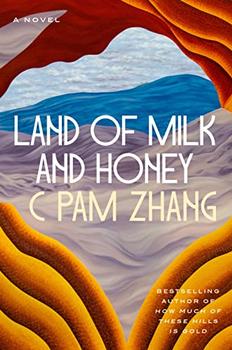Summary | Excerpt | Reviews | Beyond the Book | Readalikes | Genres & Themes | Author Bio

A Novel
by C Pam ZhangOne
I fled to that country because I would have gone anywhere, done anything, for one last taste of green sharp enough to pierce the caul of my life. I was twenty-nine, a hungry ghost, adrift. I hadn't seen California in ten years, hadn't tasted a strawberry or a leaf of lettuce in three. Hunger was simple, as the rest was not.
Here is the rest: I was an American stranded in England when America's borders closed; I was a cook as that profession lay dying. Both troubles shared one source, namely the smog that spread from a cornfield in Iowa and soon occluded the sun, smothering as it went fields of wheat in Canada and paddies of hard yellow rice in Peru. No more lemon trees fragrant on the slopes of Greece, no more small sweet Indian mangos. Biodiversity fell. Wildlife and livestock perished for lack of feed. Scientists bickered over the smog's composition and politicians over whether pollution or lax carbon taxes or China or nuclear testing or America or Russia were to blame, and all the while the darkness, slightly acidic, ate its way through fertile fields. America plunged into famine while my career hung suspended by the sea—the wrong sea, the oily, inhospitable Atlantic. Each morning I walked to the American consulate to hear the answer, Soon. Each afternoon I thawed frozen fish at the restaurant that underwrote my refugee visa. My life was dredge, fry, plate. My life was wait, wait, wait.
The day the letter arrived from California was the day the chef announced pesto cut from the menu for good. No more nuts and seeds in the pantry, and no basil, not even the powdered kind. I barely heard. I slipped my envelope into the walk-in freezer, as if ice might cool desire.
With my back against chilled steel, I extracted not an American reentry permit but a bill. The attached letter informed me that my dead mother's apartment in Los Angeles had burned down. Regrettable accident, the lawyer wrote of the riot that caused it, and then, legally liable. Cataloged in exhaustive detail were waste disposal fees and firefighting fees and city emissions fines, but nowhere did the bill mention the color of the apartment walls, which I could no longer recall. No avocados, no strawberries, no almonds. California had become a food desert and I imagined wind howling through broken windows, scouring, dry, unclean.
The door opened as I was doing the math. Chef says break's over, a line cook told me. He wants you to make a sub for the pesto.
With what?
The cook kicked a bag of flour on his way out. Anything you want, princess, so long as you use this shit.
The flour puffed in a fine gray cloud. No parsley, no sage, no produce of any sort. It was spring. March. But a false spring in which crops would fail for the third year running. Blame the smog's acidic nature, as some did; blame the same anhydrites that doomed the dinosaurs, or a lack of sun and morality; what it amounted to was skies that were gray and kitchens that were gray, you could taste it, gray. No olives, no quails, no grapes of the tart green kind for Champagne. I took stock of the restaurant's dwindling supplies: dusty tins, icy slabs of years-old fish. Mostly it was bag after bag of the mung-protein-soy-algal flour distributed by the government.
We were lucky to have it! they said. The flour was a miracle of nutritional science, engineered from plants that tolerated dark. Lucky the smog had taken a year and a half to reach Europe, lucky to escape the famine that ravaged the Americas and Southeast Asia, lucky that mung-protein flour was calorie for calorie cheaper than the cobbled-together diets of old. Yet the flour was gritty and gray, and the bread it baked could not be coaxed to rise. I am speaking of an occlusion in my twenty-ninth year, a dimming of how far I could see in front of me; I am speaking not only of the air.
Chef had lost its meaning, like lucky, like fresh, like soon. No saffron, no buffalo meat, no polished short-grain rice. Dishes winked out from menus like extinguished stars as a conservative, nativist attitude seized the few restaurants that remained open thanks to government subsidies. As they shut borders to refugees, so countries shut their palates to all but those cuisines deemed essential. In England, the shrinking supplies of frozen fish were reserved for kippers, or gray renditions of cod and chips—and, of course, a few atrociously expensive French preparations with which a diner might buy, along with sour wine, the illusion that she still lived in luxury. Back to stodgy safety. Back to national dishes unchanged for hundreds of years. The loss of pesto should have come as no surprise in a world with no favas, no milkfish, no Curry Lane in London or Thai Town in LA, no fusion, no specials of the day, no truffles turned out like sheepish lovers from under their blankets of sod. We were lucky, those around me said. We survived.
Excerpted from Land of Milk and Honey by C Pam Zhang. Copyright © 2023 by C Pam Zhang. All rights reserved. No part of this excerpt may be reproduced or reprinted without permission in writing from the publisher.






Your guide toexceptional books
BookBrowse seeks out and recommends the best in contemporary fiction and nonfiction—books that not only engage and entertain but also deepen our understanding of ourselves and the world around us.